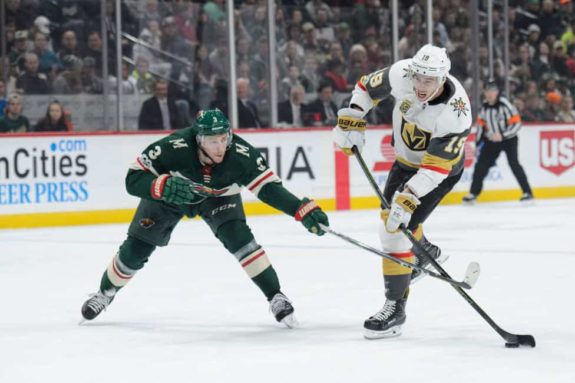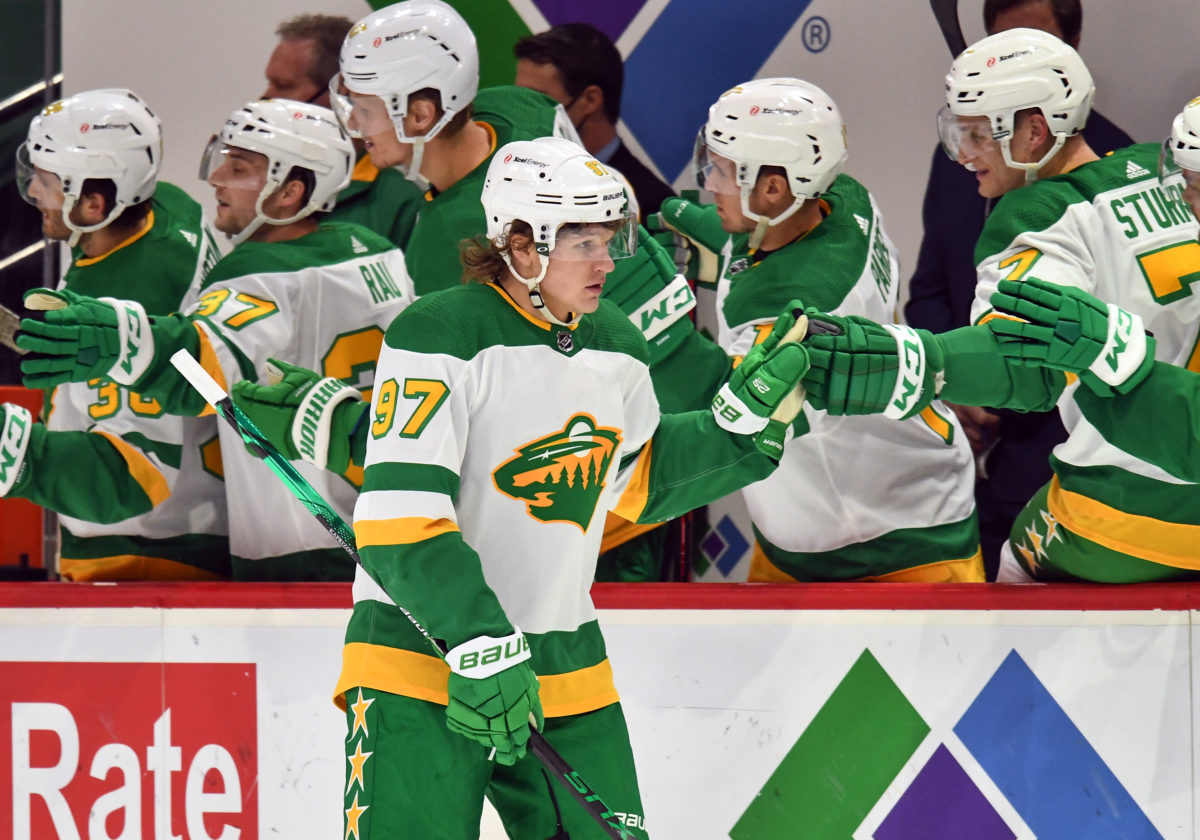An emphatic 6-1 win over the St. Louis Blues on Monday night may have erased the memory of the Vegas Golden Knights’ three-game losing streak and taken part of the sting out of a streak that cost them the Honda West Division lead, but it didn’t do anything to address the club’s newfound Minnesota Wild problem.
While the West-leading Colorado Avalanche are still the Golden Knights’ biggest divisional threat, the Wild can’t be taken lightly. Vegas’ probable first-round playoff opponents have proven to be tough, winning four of six head-to-head meetings between the teams this season. Furthermore, in those clashes, Minnesota held a top-10 offense to just six goals.
In previous seasons, this could have easily been shrugged off as an anomaly, as when one team has the number on a much better opponent. This year, however, the Golden Knights don’t have that luxury. Not only do the eight games against Minnesota account for 14.3% of the regular season, but their vexing rivals from the Twin Cities are pretty good, with rookie phenom Kirill Kaprizov leading the way.
Head-to-Head History
Though magnified in a season that features games against just seven different opponents, the Golden Knights’ struggles against the Wild aren’t a new phenomenon. Vegas has won five playoff series in their history, while Minnesota has won none in the same time frame; however, their regular season head-to-head matchup is tilted decidedly in the Wild’s favor.

The Wild hold a dominant 10-4 lead all-time, including a 5-1 mark in games at their home Xcel Energy Center. That record, plus the Knights’ sparse 2.21 goals-per-game average against Minnesota, mark the organization’s worst numbers against any team in the Western Conference. (from ‘Golden Knights’ struggles in Minnesota continue with loss to Wild,’ Las Vegas Sun, 03/08/2021)
Matchup Problems
While it’s hard to draw conclusions across seasons, when different personnel are involved, Minnesota’s traditionally tough defensive approach and physicality seem to be the constant that Vegas had struggled to overcome, as well as their goaltending. This season, the Wild’s defensive top four, including captain Jared Spurgeon, Ryan Suter, Matthew Dumba and Jonas Brodin have all stood out at various times as Vegas stoppers.
Between the pipes, veteran Cam Talbot and Kaapo Kahkonen have excelled against the Golden Knights. Talbot has earned the bulk of the work, with a 2-1-1 record, a 2.93 goals-against average (GAA) and a .908 save percentage (SV%). More impressive, albeit in a smaller sample size, has been the 24-year-old Kahkonen, who has won both of his Vegas assignments, sporting a 1.51 GAA and .943 SV%, including his first career shutout.
“Both Talbot and Kahkonen have been doing a great job in net all year. I don’t see either one grabbing the spot because they seem to do well as a tandem,” suggested The Hockey Writers’ Wild contributor Mariah Holland. “It’s really hard to choose one or the other.”

Kahkonen isn’t the only Wild youngster causing problems. Fellow Calder Trophy candidate Kaprizov has notched three goals against the Golden Knights this season, as has linemate, Joel Eriksson-Ek. They form two-thirds of Minnesota’s youthful top line with Jordan Greenway, a trio of players born in 1997 who earn a combined $4.5 million and have given Vegas fits with their speed and dynamic offensive talent.
Resiliency the Key
More than one player, the Wild have shown strong character as a group with several resilient efforts against Vegas. The most recent back-to-back saw Minnesota rally from a one-goal deficit three times. Holland thinks that’s a critical component to the club’s rise in the division. “I think their key has been not giving up,” said Holland. “They constantly fight back and push until they score or run out of time.”
In each of the Wild’s recent one-goal victories over Vegas, it was the Golden Knights who struck first with goals in the first half of the opening period. However, in both T-Mobile Arena contests, Minnesota showed they weren’t intimidated and tightened up their play and dictated pace to change the momentum.
Why It’s Important
This season’s divisional postseason format has heightened the playoff race, especially in the West. Even with encouraging win streaks by the Arizona Coyotes and San Jose Sharks, Minnesota has a five-point lead on its nearest threat for third in the division, with two games in hand to boot. Unless Vegas can still catch the streaking Avalanche for top seed over the final 18 or 19 games, a Golden Knights-Wild first-round series appears likely.
Minnesota will host the two final games between the teams late in the season, by which time their first-ever playoff matchup could be set. For now, however, the severity of the Golden Knights’ ‘Wild problem’ is debatable. This is important as we arrive at a trade deadline when teams could make moves with their opponent in mind. Can Vegas add depth scoring to take advantage of Minnesota’s thinness upfront? Should they dial up their speed via trade or call-up? Can they find a hard-nosed net presence to throw Kahkonen off his game?
The deadline aside, the bigger question here is how much attention should Vegas pay to their divisional foe who could disrupt the highly anticipated Golden Knights versus Avalanche Honda West Division Final. On one hand, there’s reason to be confident that the clock will ultimately strike midnight on the upstart Wild and that Vegas will prove to be the better team. On the other hand, the Golden Knights are built to win now and failing to respect Minnesota as a threat could have severe consequences come May.